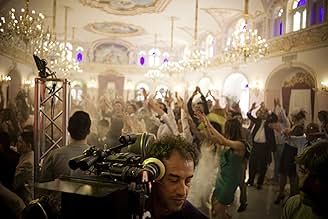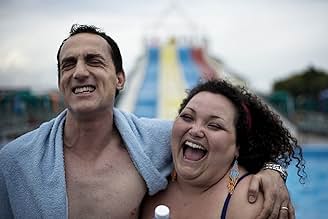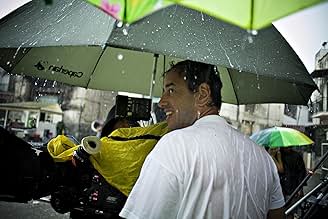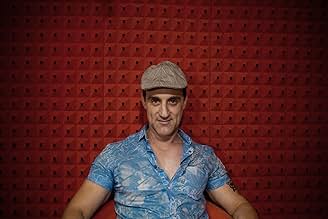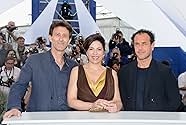VALUTAZIONE IMDb
6,8/10
5935
LA TUA VALUTAZIONE
Luciano è un affascinante pescivendolo, la cui inaspettata e improvvisa ossessione per la competizione in un reality show lo porta in una tana di percezioni distorte e paranoia.Luciano è un affascinante pescivendolo, la cui inaspettata e improvvisa ossessione per la competizione in un reality show lo porta in una tana di percezioni distorte e paranoia.Luciano è un affascinante pescivendolo, la cui inaspettata e improvvisa ossessione per la competizione in un reality show lo porta in una tana di percezioni distorte e paranoia.
- Regia
- Sceneggiatura
- Star
- Premi
- 12 vittorie e 19 candidature totali
Recensioni in evidenza
One of the things I have read more frequently about this movie is that, since it talks about the TV program "Big Brother", which in Italy has already reached the 12th season, it's supposed to be a decade late. Well: it's not, as the "Reality" mentioned in the title is obviously not the one of the TV-genre, but the actual one of nowadays Italy.
As Woody Allen wrote once, "life doesn't imitates art: imitates bad television". Following this line, the first scene is by far the more "fantastic" of the whole movie: we see an incredibly rich marriage ceremony, and we are not on TV or in any other fiction, but we are supposed to be in the real world - even if the settings and the outfits looks like a David LaChappelle picture. But later, when the guests go back to their homes, we see how theirs everyday "Reality" is made of poor dirty houses, impossibly crowded interiors, daily struggles and tricks to arrange a living. All places depicted completely lack any sign of awareness or responsible living in the world: newspapers don't exist, books are never read or shown, Internet is never searched – and receipts during commercial transactions are never issued. In this wasteland of culture and decency, feelings still grows. We can see that the main character still genuinely loves and cares for his wife and kids, and he could be called, in his own way, a good family man. But disaster suddenly happens when his set of values proves to be not enough to properly relate with the ghosts of fame and success.
This "Bigbrother" thing, when it was introduced in Italy had some cultural appeal, and for some months represented something worthy to talk about. But it has quickly evolved in a tire and sad repetition of the same situations, that seems to aim at a lower target every further year: and after more than 10 years of lowering, now it doesn't have audiences anymore, but victims. This movie will show you how one of those victims undergoes his own sacrifice. So, be prepared: it can't be anything else than a very sad story – highlighted anyhow by some great actor performances.
As Woody Allen wrote once, "life doesn't imitates art: imitates bad television". Following this line, the first scene is by far the more "fantastic" of the whole movie: we see an incredibly rich marriage ceremony, and we are not on TV or in any other fiction, but we are supposed to be in the real world - even if the settings and the outfits looks like a David LaChappelle picture. But later, when the guests go back to their homes, we see how theirs everyday "Reality" is made of poor dirty houses, impossibly crowded interiors, daily struggles and tricks to arrange a living. All places depicted completely lack any sign of awareness or responsible living in the world: newspapers don't exist, books are never read or shown, Internet is never searched – and receipts during commercial transactions are never issued. In this wasteland of culture and decency, feelings still grows. We can see that the main character still genuinely loves and cares for his wife and kids, and he could be called, in his own way, a good family man. But disaster suddenly happens when his set of values proves to be not enough to properly relate with the ghosts of fame and success.
This "Bigbrother" thing, when it was introduced in Italy had some cultural appeal, and for some months represented something worthy to talk about. But it has quickly evolved in a tire and sad repetition of the same situations, that seems to aim at a lower target every further year: and after more than 10 years of lowering, now it doesn't have audiences anymore, but victims. This movie will show you how one of those victims undergoes his own sacrifice. So, be prepared: it can't be anything else than a very sad story – highlighted anyhow by some great actor performances.
I saw this film as part of the Rotterdam film festival 2013 (IFFR), about someone pressured by his family to candidate himself for a Big Brother house. It all gets out of hand when he is not accepted initially but yet thinks to be on a sort of waiting list while being observed by the Big Brother team. He assumes being selected for a very special role in that TV show, and will be given a part later on when he proves to fit their criteria.
During the final Q&A the director said that the film is about dreaming to escape from reality and to loose one's identity. He describers the main character (Luciano) to be a victim of the system. Luciano desire to get into the Big Brother house comes from initial pressure by his family, though later on he himself gets a bit mad about it. He continues with rigor, in spite of protests from the same family that pressured him in the first place. The importance of the family cannot be stressed enough and has a crucial role in the story, something typical for Italy as stated by the director.
The story forming the basis for this scenario really happened to a brother of the director's wife. (By the way: He is fully recovered now. He has even re-opened his fish shop at the same spot in Naples.) And giving away his furniture to make a good impression on imaginary inspectors, was also real, even to the extent that his wife did not dare leaving the house in fear of finding it empty on return. Even the cricket that Luciano suspected to be full of camera's, appeared in reality too. The ending scenes seem a bit far fetched (I won't reveal details, for spoilers sake), but can be deemed all right if it really comes from the true story that was the basis of this film.
The director also said that the actors were taken from theater or cabaret (except one, a family member). Faces were an important criterion in the selection process. The roles they play and their appearances reflect a "normal" family from the region. That explains the overload of wrinkled people, and especially women looking like the stereotypical "mama" that we see in food commercials. Luckily, the main characters (Luciano and his wife) are not so bad looking, in contrast to their entourage.
All in all, the film is a nice product with many hilarious moments. It is a bit too long, in my opinion, particularly when you get easily annoyed by heavily gesturing Italians, talking with a waterfall of words (it looks that way for us, understanding no Italian) and overly dramatic movements. We won't consider this movie memorable, but it serves its purpose as family entertainment very well. Anyway, the audience seemed to enjoy themselves nevertheless. The venue (over 500 seats) was fully booked on a Sunday morning.
During the final Q&A the director said that the film is about dreaming to escape from reality and to loose one's identity. He describers the main character (Luciano) to be a victim of the system. Luciano desire to get into the Big Brother house comes from initial pressure by his family, though later on he himself gets a bit mad about it. He continues with rigor, in spite of protests from the same family that pressured him in the first place. The importance of the family cannot be stressed enough and has a crucial role in the story, something typical for Italy as stated by the director.
The story forming the basis for this scenario really happened to a brother of the director's wife. (By the way: He is fully recovered now. He has even re-opened his fish shop at the same spot in Naples.) And giving away his furniture to make a good impression on imaginary inspectors, was also real, even to the extent that his wife did not dare leaving the house in fear of finding it empty on return. Even the cricket that Luciano suspected to be full of camera's, appeared in reality too. The ending scenes seem a bit far fetched (I won't reveal details, for spoilers sake), but can be deemed all right if it really comes from the true story that was the basis of this film.
The director also said that the actors were taken from theater or cabaret (except one, a family member). Faces were an important criterion in the selection process. The roles they play and their appearances reflect a "normal" family from the region. That explains the overload of wrinkled people, and especially women looking like the stereotypical "mama" that we see in food commercials. Luckily, the main characters (Luciano and his wife) are not so bad looking, in contrast to their entourage.
All in all, the film is a nice product with many hilarious moments. It is a bit too long, in my opinion, particularly when you get easily annoyed by heavily gesturing Italians, talking with a waterfall of words (it looks that way for us, understanding no Italian) and overly dramatic movements. We won't consider this movie memorable, but it serves its purpose as family entertainment very well. Anyway, the audience seemed to enjoy themselves nevertheless. The venue (over 500 seats) was fully booked on a Sunday morning.
I'm not afraid to admit that I actually prefer this film to Garrone's previous characters-melange crime-drama GOMORRAH (2008, a 7/10), albeit both won Cannes's Grand Prize of the Jury in their respective years.
I watched the film in KVIFF a few days ago, and I am thrilling to see that there is a change of attitude in detailing a riveting story of Naples people's mundane life, about a reality-show sparks a never-be-quenched yearning of a Naples fishmonger's pipe dream of becoming a reality-star, which turns him paranoid about his surroundings and mars his and his family's life, and all winds up in an ambiguous ending.
REALITY has a drastic alternation in its visual impetus, a Fellini-esque Napoli milieu (with the mammoth structure of kins under a dilapidated tableaux), which could instantly gain some positive impression from the film's opening sequence, which induces a tremendously lush wedding ceremony. A comical tone has never ceased to hover around the typical but accurate portrayal of the workaday life of our protagonist and his family (a hanky-panky retail business of pasta-making robots is the highlight) until the latter part when everyone on screen and offscreen realize the one-sided opportunity will never arrive except for our leading man in the film, so literally how miserable his ending would be has grown into the main concern hanging the film's weight. And there would be a great chance it would plunge into an irreversible maw of tragedy, but luckily it doesn't, Garrone alters a lightly grotesque route and resorts to a more theatrical maneuver to leave the finale in a spell bound shot, effectively ridicules and bashes the reality-show oriented credo in the present-time.
The gorgeous score from extraordinarily talented composer Alexandre Desplat is another selling point, seamlessly goes with the plot, and thwarts a likely bathos when the soothing comedic temper is steadily mitigated and the film veers to a suspicious restlessness and ultimately the irrational madness.
The cast is plainly spot-on in spite of Aniello Arena's over-handsome and beefcake image as a fishmonger, Raffaele Ferrante's rendering of a reality-star who originally rose from the mass, is both hilarious and sarcastic in stressing the ill-infused celebrity-rules notion, which is indubitably not the only entrance to fame and fortune for those wide-eyed dreamers.
I watched the film in KVIFF a few days ago, and I am thrilling to see that there is a change of attitude in detailing a riveting story of Naples people's mundane life, about a reality-show sparks a never-be-quenched yearning of a Naples fishmonger's pipe dream of becoming a reality-star, which turns him paranoid about his surroundings and mars his and his family's life, and all winds up in an ambiguous ending.
REALITY has a drastic alternation in its visual impetus, a Fellini-esque Napoli milieu (with the mammoth structure of kins under a dilapidated tableaux), which could instantly gain some positive impression from the film's opening sequence, which induces a tremendously lush wedding ceremony. A comical tone has never ceased to hover around the typical but accurate portrayal of the workaday life of our protagonist and his family (a hanky-panky retail business of pasta-making robots is the highlight) until the latter part when everyone on screen and offscreen realize the one-sided opportunity will never arrive except for our leading man in the film, so literally how miserable his ending would be has grown into the main concern hanging the film's weight. And there would be a great chance it would plunge into an irreversible maw of tragedy, but luckily it doesn't, Garrone alters a lightly grotesque route and resorts to a more theatrical maneuver to leave the finale in a spell bound shot, effectively ridicules and bashes the reality-show oriented credo in the present-time.
The gorgeous score from extraordinarily talented composer Alexandre Desplat is another selling point, seamlessly goes with the plot, and thwarts a likely bathos when the soothing comedic temper is steadily mitigated and the film veers to a suspicious restlessness and ultimately the irrational madness.
The cast is plainly spot-on in spite of Aniello Arena's over-handsome and beefcake image as a fishmonger, Raffaele Ferrante's rendering of a reality-star who originally rose from the mass, is both hilarious and sarcastic in stressing the ill-infused celebrity-rules notion, which is indubitably not the only entrance to fame and fortune for those wide-eyed dreamers.
When I started watching this movie I thought "Well, the director is Garrone and the movie is set in Naples, so it must be a copy of Gomorrah or something like that". Instead I was surprised of how Garrone nicely brought up another aspect of Naples and its inhabitants. The setting is a poor neighborhood in the Italian port city and the main character is Luciano, a fishmonger and father of two children. His daily life is ordinary and uneventful and he struggles to earn money through his first job and his second one which consists in cheating people by selling them some cleaning devices. Everything could change when he has the opportunity to participate to the Big Brother rehearsals where he can exploit his qualities as entertainer. His certainty of making it to the show is so strong that he becomes paranoid about people of the Big Brother casting staff spying on him to see if he's really a character as he claims to be in everyday life. He does many crazy things like selling his fishmonger activity and doling out his personal belongings to poor people in order to impress the alleged casting personnel following him. His mental condition soon worsens and develops into craziness which of course affects inevitably his family life. What I liked best about this movie is how Garrone underlines how miserable everyday life can be and how everyone is in search of the big opportunity to get out of misery. This however can lead to ruining personal and family life. I also appreciated how the director shows how some feelings and actions can be so evidently false as that of Luciano of being overly generous with poor people only for personal purposes. One last thing I would like to mark is Garrone's style of shooting, which was quite like that of Gomorrah, that's very simple and with seemingly amateur close shootings. Compared to Gomorrah however I would say that he wanted to give a more dreamy touch and also something Fellinesque: in one scene Luciano comes back home from the Big Brother rehearsal in Rome and, in the beautifully lit neighborhood, he's welcomed by his neighbors as a hero. In the next scene the neighborhood is showed in daytime during its normal daily activity, presenting all its simplicity and misery. Therefore an evident contrast is shown between dream and reality.
Lo sapevi?
- QuizAniello Arena, the lead actor, served nearly 30 years in prison for murder and was on parole when "Reality" was filmed.
- ConnessioniFeatured in At the Movies: Episodio #10.21 (2013)
I più visti
Accedi per valutare e creare un elenco di titoli salvati per ottenere consigli personalizzati
- How long is Reality?Powered by Alexa
Dettagli
Botteghino
- Lordo Stati Uniti e Canada
- 72.577 USD
- Fine settimana di apertura Stati Uniti e Canada
- 7072 USD
- 17 mar 2013
- Lordo in tutto il mondo
- 3.350.996 USD
- Tempo di esecuzione1 ora 56 minuti
- Colore
- Mix di suoni
- Proporzioni
- 2.39:1
Contribuisci a questa pagina
Suggerisci una modifica o aggiungi i contenuti mancanti



